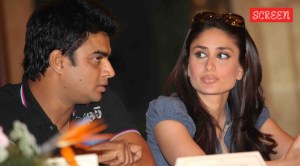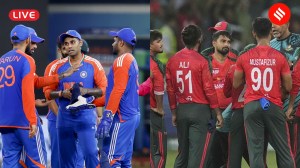Oedipus Lives in Heggodu
For a few months in a year, residents of a Karnataka village step out of their lives and turn into actors of Ninasam’s amateur theatre group.
 It takes a village: Balaga’s performance of Oedipus Rex. (Photos Courtesy: Ninasam)
It takes a village: Balaga’s performance of Oedipus Rex. (Photos Courtesy: Ninasam)
Bent over a prop made of wood, Subramania Bhatt barely looks up as he polishes it. With six hours to go before the play opens at Ninasam’s annual theatre festival, the 50-year-old has a lot to finish. He has taken the day off his duties as the village purohit, and asked a relative to look at the farm while he prepares for the show. Bhatt dismisses a request for an interview, suggesting we return after two hours. When we arrive in the green room, he is unrecognisable. With his face painted, he sits on a plastic chair in a white costume, clutching a white beard in his hand. He is readying to play his part as Creone in a Kannada adaptation of the Greek tragedy Oedipus Rex. “As a part of Balaga, we all multitask,” he says.
Balaga is one of the most important and oldest wings of Ninasam, a cultural organisation founded by late thespian KV Subbanna in Heggodu, a village in Karnataka’s Shivamogga district. The foundation for Ninasam was laid by Subbanna in the early 1940s, when he and his friends would get together in Heggodu every evening to discuss art, culture, politics and current affairs. Soon, an amateur group was producing small plays under the cultural organisation they had formed. While they started with producing plays based on the Puranas, eventually Subbanna expanded the repertoire. Several renowned names would go on to write and direct plays — adaptations of Brecht, Shakespeare and several Indian playwrights — for Ninasam. Subbanna also started a 10-day film appreciation course that later evolved into the Samskriti Shibira, the week-long theatre festival which Ninasam has been organising for nearly three decades.
Balaga is made up entirely of locals who reside in and around Heggodu. Every year, its members put up a play that they travel with to various villages and towns, performing also at prestigious spaces like Bengaluru’s Ranga Shankara. Although amateurs, they take their craft seriously. For instance, Bhatt dedicates three-and-a-half hours to rehearsals every evening for a couple of months leading up to July 16, when the play premieres at Ninasam to mark Subbanna’s death anniversary. Bhatt also helps with other departments, especially set design. “I learned Yakshagana in my 20s but could not pursue it as an art due to financial and personal constraints. But three years ago, when things eased up a bit, I joined Balaga,” he says.
Most members of this troupe, with a handful of exceptions, are amateurs between 20 and 50 years old. Nearly all have day jobs that range from teaching to farming and business. Manjunisha, 22, joined Balaga at the age of eight, taking after her teacher mother who has been a part of the group for over two decades. Studying to be a chartered accountant in the nearby Sagar town, Manjunisha is currently on leave to rehearse for this year’s performance.
Every year, Ninasam, which is now led by Subbanna’s son Akshara KV, invites a theatre director to direct a play for Balaga. “We have had several renowned playwrights and directors direct for Balaga in the past, including BV Karanth and Prasanna,” says 50-year-old Vidya Hegde, one of the key members of Balaga and Akshara’s wife. This year’s play, performed on the third evening of the five-day festival, was directed by Ganesh Mandarti, an ex-student of Ninasam’s repertory Tirugata. A Yakshagana proponent, he employed aspects of the performance art to his adaptation of Oedipus Rex.
Mandarti is deep in thought as he steps out of the rehearsals. The 30-year-old is wondering if his experiment will work on stage. “I have dramatised a large part of the story in the first 20 minutes, incorporating Yakshagana elements in the characters of the Oracle of Apollo and the Sphinx,” he says. Working with amateurs comes with its own set of challenges. Mandarti explains that while they are able to bring a certain innocence to their characters, it requires a lot of work to get a complex play like Oedipus right. Casting is crucial, especially since the volunteers are not put through auditions. “We cannot reject them … Ninasam was born from and for them,” says Vidya.
She points out that the directors mostly look for characters that are closer to the people’s own lives. Mandarti cites an example, “Before casting for the play, I spoke at length with all the members of Balaga. When I came across Raghuvendra N, I knew he would be fit to play Oedipus. He lost his father when he was young and his mother passed away a few years ago. His two sisters are married. He now lives a lonely life, eating at restaurants and working part-time to make ends meet. I have tried to channel his anger and loneliness in the character.” But Vidya says they cannot push the actors beyond a point. “The idea is for them to enjoy the process and bond as a community.”
For the villagers, these challenges present an opportunity. Every year, work on the play begins on June 1. The first 10 days are spent developing a rapport with the director, studying the text, watching films that may have been made on the play and discussing the nuances. Srinath Dixit, a 30-year-old computer hardware professional, works in Sagar a few kilometres away but drives down every evening for those few weeks. Bhatt and his wife take turns every year to participate. “When she is acting in a play, I manage the household chores,” Bhatt explains. Susheela Hegde, who plays Sphinx, is among the few permanent employees of Ninasam who also work with Balaga. A trained professional, she works in Ninasam’s costume department through the year, assisting Vidya. When her musician husband, MP Hegde, also takes part in a production, they fall back on neighbours to take care of their two children. “This is what we join Balaga for. A sense of community.”
Photos


- 01
- 02
- 03
- 04
- 05





























